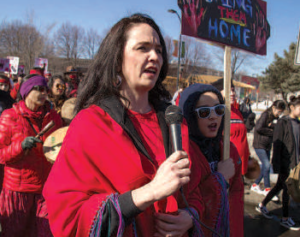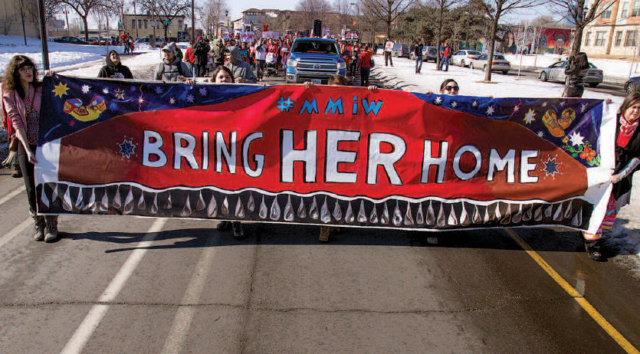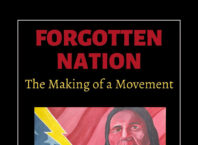By Camille Erickson
On a tepid winter day this February, hundreds of people adorned in red attire flooded into the Minneapolis. American Indian Center (MAIC) for the annual march to honor missing and murdered Indigenous women, girls, boys, LGBQI, Two Spirit, and transgender relatives. After words and song, participants gathered outside to march east on Franklin Avenue under a blistering blue sky.
Before embarking, I spoke with Marisa Carr (Turtle Mountain Ojibwe) who is the “Live It!” Program Coordinator at the Division of Indian Work’s Youth Leadership Development Program. Imparting the significance of this day to me she shared, “I am here today because Native women in my community and all over North America are being murdered and going missing at astronomical numbers. The authorities are not looking for us and we are not being found.”
Carr’s declaration refers to a crisis that has reached epidemic proportions and disproportionately touches the lives of Native women, girls, and their families. The National Crime Information Center received 5,712 cases of missing Native women in 2016 alone. And according to the Centers for Disease Control and Prevention, homicide of American Indian and Alaska Native women ages 10 to 24 years old is the third-leading cause of death.
Carr continued, “I don’t see how this could happen if this country recognized our humanity. So I am here in solidarity with all of my Native sisters across North America because we deserve better. We deserve to live.”
Cheryl Secola (Bois Forte Ojibwe), who works on the Prevention Through Cultural Awareness Program at MAIC, echoed Carr’s concerns. “I see that the rate of our women murdered and going missing are ten times the national average. I don’t think there are enough statistics out there, but the Savanna Act is going to change that.”
The statistics back up Secola’s concerns: Native women are murdered at more than ten times the national average on some reservations. In response to these tragic statistics, Democratic Senator Heidi Heitkamp introduced a bill called the Savanna Act in 2017 to intervene in the vicious cycles of violence taking the lives of Native women and girls.
The act aims to increase tribal access to federal crime databases and generate procedures to diligently respond when Native women go missing or are murdered. It also requires a report to Congress every year with collected data on missing and murdered Native women.
The act is named in honor of Savanna LaFontaine-Greywind, a 22-year-old member of the Spirit Lake Tribe who was murdered last year in North Dakota. Advocates reverently spelled out her name on posters and banners held throughout the march. Relief for surviving families still remains to be seen, as reports of missing and murdered Indigenous women persist and research on the issue stays inadequate.
Secola expressed the level of loss that this crisis has meant for her personally. “I made relationships with a lot of women who are gone. Out of twenty women in that group, probably 5 of them have been murdered. That is just not okay and it’s a constant. For me, I’m here today to honor those people and show support.”
Urgent action is needed to address the persistence of this spectrum of violence. Fortunately, Native service providers, advocates and Native-led organizations are not backing down.
Minnesota Indian Women’s Sexual Assault Coalition
Two days before the march, I sat down with Nicole Matthews (White Earth Ojibwe), Executive Director of Minnesota Indian Women’s Sexual Assault Coalition (MIWSAC), to hear the fierce commitment she upholds to combating violence against Native women and children.
 While gently bouncing her grandson in her lap, she began sharing the extensive services the Coalition provides in the form of education and resources to eliminate this sexual violence. Shortly into our conversation, I knew she was just scraping the surface.
While gently bouncing her grandson in her lap, she began sharing the extensive services the Coalition provides in the form of education and resources to eliminate this sexual violence. Shortly into our conversation, I knew she was just scraping the surface.
Formed in 2001, MIWSAC started in part to address the absence of research and services geared specifically towards Native women and children impacted by sexual violence. Their vision: Creating Safety and Justice for Native Women Through the Teachings of Our Grandmothers.
Each year, MIWSAC provides trainings, public service announcements, community forums, technical assistance, educational material, site visits, research, and more. Matthews described the importance of training tribal advocates working with Native women on how to best employ culturally-specific sexual assault advocacy curriculum.
In their approach, MIWSAC also combats the erasure of Native women’s experiences while restoring respect. Through a survivor-centered mission, the Coalition generates greater awareness and resources to eliminate systems of sexual exploitation.
Matthews said, “All of our work should be rooted in survivor stories […] It’s always important to listen to what survivors need now and never lose touch with that voice. That’s really who we are working for. It’s important that we don’t ever get too far from that.”
To better assess the frequency of violence and emotional trauma unjustly experienced by Native women, as well as the lack of services to support them, MIWSAC along with Prostitution Research & Education, conducted an extensive project titled, “Garden of Truth: The Prostitution and Trafficking of Native Women in Minnesota.” Currently, it serves as the most extensive research on the subject in the state. Matthews, alongside five other researchers, embarked on compiling the results of 105 interviews. The interviews collected vignettes about the family history of women in prostitution or trafficking to times they experienced homelessness or sought support at a rape crisis center. Among myriad qualitative and quantitative findings culled from the interviews, Matthews explained how they found evidence that culturally-sensitive services have a greater impact on survivors. There was a consistent call for more services “for Native women by Native women.”
Supporting services led by Native women remains essential to the work MIWSAC leads. “It is nice to sit and meet with someone who has some understanding of not only where you come from, but also your historical background,” Matthews shared. “You don’t have to explain everything. There is a reflection back – a common understanding, language and belief.”
According to the report, women felt that engaging in Native cultural practices was also pivotal in their survival with many seeking Native healing approaches along-side mainstream services. But the National Institute of Justice Report in 2016 found that 38% of Native women reported not receiving victim services, let alone culturally appropriate support.
Matthews is trying to change that. She emphasized, “We have heard time and time again that that’s what Native women, Native survivors want. I think it is important for us to be responsive and for us to always be listening to the voices of survivors and what their needs are.”
Restoring respect
Matthews sees the problem of missing and murdered Indigenous women as one issue entangled in many that the Coalition focuses on. For instance, the intersections between sexual violence and the disappearance of Indigenous women cannot be overlooked. Often, the same victims of sexual violence and sex trafficking, who MIWSAC fights for, are also at risk of going missing or being murdered.
One factor, among many, that Matthews believes is fueling Native women’s increased risk to violence is the systematic erasure of their stories. Native women’s experiences are rendered invisible. “Often times, unless it’s someone from the dominant culture,” Matthews noted, “we don’t hear about those stories when they are missing.”
Matthews said, “Who is looked at as throwaways in our society? Who are people not going to go looking for?Certainly our families and our communities go looking. But often times when our women go missing, there is barely a whisper outside of our communities in the media and general public.”
In addition, Native women are especially vulnerable to sexual violence if certain risk factors are present, including homelessness and other elements of poverty. Moreover, prostitution and trafficking, which are often excluded from conversations on sexual violence, overwhelmingly impact Native women. As a result, these same women are more susceptible to violent outcomes.
Among many disquieting conclusions, MIWSAC’s study found that 98% of interviewees were currently or previously homeless. 84% of interviewees had been physically assaulted in prostitution. These statistics demonstrate how Native women experiencing homelessness or insufficient access to services face a high risk of being sexually exploited.
These factors have roots in historical legacies of subjugation, assimilation, and genocide of Native people in Minnesota. “Of course, we also have to look at historical trauma,” Matthews explained. “We have to look at racism and Native women being targeted because they are Native women.”
The Garden of Truth report elucidates how the devaluation of Native victims of trafficking mirrors the treatment of Native women that resulted from the US government’s deliberate practice of genocide and colonization. 62% of participants named a connection between the colonization of Native people and prostitution and trafficking today.
There is also little historical precedent for justice or accountability as racial and colonial laws continue to have negative ramifications on Native communities, while excusing non-Indian perpetrators of violence. A National Violence Against Women survey identified that 88% of violent crimes against Native women were committed by non-Indians.
Yet, in 1978 the Supreme Court ruled that Indian tribes did not have criminal jurisdiction over non-Indians (Oliphant v. Suquamish Indian Tribe). Up until recently, tribes had no choice but to rely on the federal government to investigate crimes of domestic violence perpetrated on reservations by non-Indians.
This system proved largely ineffectual as the US Attorney’s Office refused to prosecute over half of the violent crimes referred to them by tribes; 67% of those cases were considered sexual-abuse related. Perpetrators of violence against Native women walked away from crimes unpunished.
In a call to mend this judicial oversight, The Violence Against Women Reauthorization Act (VAWA), was renewed in 2013 to include important provisions that could better protect Native women. This remedy redistributed power to local justice entities in tribal communities, with notable limiations in scope. (The law only accounts for violence against certain intimate partners and does not extend to instances of rape by common acquaintances or strangers who are non-Indian).
To Matthews, one thing is clear. “Native women need justice. They need recognition, acknowledgment, validation, and support.” To this day, justice is rarely served.
These protections continue to be implemented, but the results of VAWA have yet to be fully seen. What’s more, VAWA is up for reauthorization this year and faces potential undermining by the current administration.
Matthews is not alone in the fight to raise awareness around this issue. Jessica Owen (Park Rapid) is another intrepid organizer of the MMIW march, and former Program Director at the Indigenous Women’s Life Net. Owen, who now works at Women of Nations, shares particular concerns with the lack of attention and resources diverted to care for Indigenous women experiencing sexual violence.
Owen was quick to share the indelible influence her upbringing had on her. “I am a part of this movement [because] my mother, my grandmother, and I had a lot of years of being abused physically, emotionally, and sexually. There had to be a time to change that. I wasn’t brought to this position and it didn’t just come to me. This is something that I had to do for my people.”
Owen explained how often survivors of domestic abuse, sexual assault, or addiction lose the support of their family. But that’s where Owen steps in. “If [women] don’t have their family any more, I’m going to be that family.”
Owen’s stories illustrate the prevalence of substance abuse women she works with experience, and the lack of resources that allow them to stay with their children as they seek opportunities to heal.
“I feel like the government is charging our people so much money to go to treatment, so much money to take our kids away,” she stated. “This is another form of genocide that is still going on right now. There are days that we are being buried in Wounded Knee graves, except now we are doing it one at a time. And no one is paying attention.”
But Owen is on a mission. After a community forum to gather input on March 6, Owen spoke with Senator Tina Smith to call for more Native-informed transitional housing for these children and mothers. Owen had questions prepared. “First, where can our women go if they are dealing with addiction issues? Can they take their kids with them? Secondly, what do you do after [they are] out of shelter? What do they do after treatment? Do we have any transitional housing programs?”
Her vision boosts even larger than a single meeting with Senator Smith. Now transitioning to work at Women of Nations, Owen is looking to expand her impact by creating the housing and direct services that she sees lacking. “Native people need a place to be with our people,” she noted. “I see a lot of our women going through [life] not knowing their traditions anymore, and not even having the opportunity to [learn].”
Acknowledging the small successes
Despite the egregious rate of violence still occurring, Matthews tries to find moments of hope. “Sometimes it’s easy to get caught up in the feel like you’re spinning your wheels,” she explained. “You feel like you haven’t made any change. But if you look back over time, we have made change and we have had made a big impact.”
Looking down at the child teething on a juice bottle in her lap, Matthews noted, “This little guy is what keeps me going. I have three kids and they keep me going. As far as self care, ceremony is important to me and being around family and friends and laughter. All of those things keep me going. I also acknowledge and celebrate the small successes that we have.”
To Jessica Owen, elder Amos Owen, her grandfather and spiritual leader, is with her in her heart each morning when she rises at four in the morning. “I get up every morning at four, I go out-side, and I pray. I pray for my people. I pray for everything I’m working on, just like my grandpa did. That makes me stronger.”







